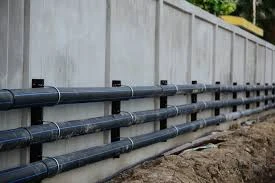نومبر . 15, 2024 12:26 Back to list
pvc pipe company
The PVC Pipe Revolution Transforming Industries with Durability and Versatility
In the vast expanse of construction and plumbing applications, PVC (Polyvinyl Chloride) pipes have emerged as one of the most significant materials in the industry. The evolution of PVC pipe companies has led to remarkable innovations that have transformed how various sectors approach infrastructure development. This article delves into the many advantages of PVC pipes, the processes behind their production, and their far-reaching impact on both the economy and the environment.
Advantages of PVC Pipes
One of the main reasons PVC pipes are so widely used is their durability. Unlike traditional materials such as metal or clay, PVC is resistant to corrosion, chemicals, and rust. This durability ensures that piping systems can last for decades without the extensive maintenance often required by other materials. Additionally, PVC pipes exhibit excellent resistance to environmental factors, making them suitable for various climates and conditions.
Another significant advantage of PVC pipes is their lightweight nature. This characteristic simplifies transportation and installation, reducing labor costs and time. Furthermore, PVC can be manufactured in various diameters and lengths, making it adaptable to multiple applications. From residential plumbing to large-scale municipal projects, the versatility of PVC pipes is unmatched.
The Manufacturing Process
The production of PVC pipes is a meticulous process that incorporates advanced technology and strict quality control measures. The creation of PVC begins with the polymerization of vinyl chloride monomer, which is then compounded with various additives to enhance its properties, such as flexibility, UV resistance, and impact strength. After these compounds are mixed, they are extruded into pipe shapes using a series of heating and cooling processes to ensure optimal consistency and quality.
Once produced, PVC pipes undergo rigorous testing to guarantee they meet industry standards. This testing includes assessments for pressure resistance, chemical compatibility, and degradation over time. Only those that pass these tests are approved for use, ensuring that consumers receive dependable and long-lasting products.
pvc pipe company

Economic Impact
The rise of PVC pipe companies has not only transformed building practices but has also contributed significantly to the global economy. As the demand for sustainable and long-lasting materials increases, so does the market for PVC pipes. This growth has stimulated job creation in manufacturing, distribution, and installation sectors, positively impacting local economies.
Moreover, the use of PVC pipes can lead to cost savings for industries reliant on efficient plumbing systems. The long lifespan and reduced need for maintenance of PVC pipes means that utilities and businesses can allocate resources elsewhere. As companies seek to improve sustainability and reduce overall costs, the adoption of PVC piping is likely to continue rising.
Environmental Considerations
While PVC pipes offer many benefits, it is essential to consider their environmental impact. PVC is a plastic product, and therefore concerns about its production, disposal, and recycling exist. However, many PVC pipe companies are adopting more sustainable practices, such as reducing energy consumption during manufacturing and developing recycling programs for end-of-life products.
Improved recycling technologies now allow for the reprocessing of PVC pipes, reducing landfill waste and promoting a circular economy. Many manufacturers are committed to sourcing their materials responsibly and ensuring that their production processes are as environmentally friendly as possible.
Conclusion
The evolution of PVC pipe companies marks a significant advancement in construction and plumbing sectors. With their remarkable durability, lightweight nature, and adaptability, PVC pipes have revolutionized the way infrastructure is built and maintained. As economic demands and environmental concerns continue to grow, the future of PVC pipes remains bright. By embracing innovation and sustainable practices, PVC pipe companies are poised to lead the industry toward a more efficient and eco-friendly future.
-
Durable PP Rigid Sheet: Lightweight, Chemical Resistant Solutions
NewsAug.21,2025
-
PVC Grey Sheet for Extraction: Chemical Resistant & Durable
NewsAug.19,2025
-
Durable PVC Pipe Fittings for Plumbing & Irrigation Needs
NewsAug.18,2025
-
HDPE Steel Belt Reinforced Spiral Corrugated Pipe | High Strength
NewsAug.17,2025
-
HDPE Pipe Fittings: Durable, Leak-Proof Solutions
NewsAug.16,2025
-
Premium CPVC Sheet: High-Temp & Chemical Resistant Solutions
NewsAug.15,2025

